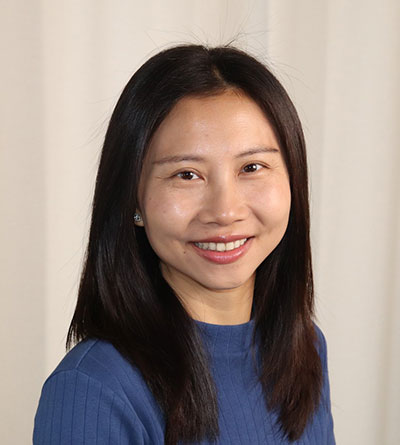New advertising professor Guolan Yang focuses on effects of digital persuasive messaging
 Guolan Yang has studied and cited works authored by professors in the Charles H. Sandage Department of Advertising since she was a doctoral student. So when she got the opportunity to meet those esteemed scholars in person at advertising conferences, Yang was further drawn to pursue a career at Illinois.
Guolan Yang has studied and cited works authored by professors in the Charles H. Sandage Department of Advertising since she was a doctoral student. So when she got the opportunity to meet those esteemed scholars in person at advertising conferences, Yang was further drawn to pursue a career at Illinois.
“Visiting the campus felt like a culmination of those years of study,” she said. “Many faculty members here share research interests similar to mine, which excited me about the prospect of collaboration.”
Yang said she’s eager to contribute to the distinguished and dynamic team at the College of Media this fall as an assistant professor in advertising with an appointment in the Institute of Communications Research.
She will be teaching “Introduction to Public Relations,” which covers a variety of topics such as the role of ethics in public relations as well as theories that guide research and practice.
Yang said her research takes a psychological perspective, investigating the effects of digital persuasive messages that do not look like traditional advertising, such as sponsored influencer content and in-feed native ads on people’s perceptions, beliefs, emotions, and behaviors.
Previously, Yang was an assistant professor in the Department of Communication, Journalism, and Public Relations at Oakland University in Rochester, Michigan, where she taught courses in advertising and public relations.
Her dissertation, titled “Advertising Recognition and Persuasion in the Context of Sponsored Influence Content: Effect of Disclosure Prominence, Message Involvement, and Persuasion Knowledge” investigated how sponsorship disclosures affect consumer understanding of sponsored influencer posts on Instagram, taking individual and situational factors into account.
Yang said her findings demonstrated that prominent disclosures are helpful to increase advertising recognition when people are low in advertising knowledge or less motivated to process the message.
“These findings offer recommendations on what practitioners could do to ensure advertising transparency and provide regulatory agencies with insights on how to improve their disclosure guidelines,” Yang said.
Her research also examined how messaging strategies such as storytelling and humor can be consolidated with innovative features of digital technologies to enhance the effectiveness of persuasive communication. One of her studies investigated how brands could use funny memes to increase audience engagement and sharing intention on social media. See some of her published work.
Yang said she’s excited to meet her students and cultivate their interest in the fundamentals of today’s advertising and public relations profession.
“I enjoy sharing with my students the most recent knowledge and skills in advertising and public relations,” she said. “I like seeing students finally grasp a difficult concept and watching their confidence soar as a result.”
—Kelly Youngblood
